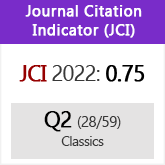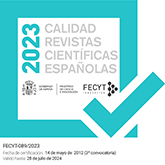The Language of Hecuba as a Suppliant in her Eponymous Play
DOI:
https://doi.org/10.3989/emerita.2022.02.2122Keywords:
Politeness theory, supplication, linguistic characterization, EuripidesAbstract
In this article, we compare Hecuba’s two supplications alongside other successful and unsuccessful supplications from the perspective of politeness theory. This comparison will enable us to track the evolution of her language throughout the plot. The differences in the language of her first and second supplications may shape the way in which she is characterized.
Downloads
References
Allan, W. (2001): Euripides. The Children of Heracles, Oxford. https://doi.org/10.2307/j.ctv1228hfq
Avezzù, G. (2019): «Hecuba's Rhetoric», in Markantonatos, A. and Volonaki, E. (eds.), Poet and Orator: A Symbiotic Relationship in Democratic Athens, Berlin- Boston, pp. 3-31. https://doi.org/10.1515/9783110629729-001
Battezzato, L. (2008): Linguistica e retorica della tragedia greca, Rome.
Battezzato, L. (2010): Euripide: Ecuba, Milan.
Battezzato, L. (2018): Euripides: Hecuba, Cambridge.
Berger, Ł. (2017): «The Old Man and Linguistic Politeness in the Comedies of Plautus», Symbolae Philologorum Posnaniensium Graecae et Latinae 27 (3), pp. 249-273. https://doi.org/10.14746/sppgl.2017.XXVII.3.14
Bond, G. W. (1981): Euripides. Heracles, Oxford. https://doi.org/10.1093/actrade/9780198140603.book.1
Brown, P. & Levinson, S. (1987): Politeness. Some Universals in Language Use, Cambridge. https://doi.org/10.1017/CBO9780511813085
CGCG = Emde Boas, E. van, Rijksbaron, A., et al., (2019): The Cambridge Grammar of Classical Greek, Cambridge. https://doi.org/10.1017/9781139027052
Coleridge, E. P. (1938): Euripides. The Complete Greek Drama, edited by Whitney J. Oates and Eugene O'Neill, Jr. in two volumes, New York.
Collard, C. (1991): Euripides. Hecuba, Warminster. https://doi.org/10.1515/9783110967722
Comrie, B. (1976): «Linguistic Politeness Axes. Speaker-addressee, Speaker-referent, Speaker-bystander», Pragmatics Microfiche 1 (7), pp. 1-12.
Conacher, D. (1961): «Euripides' Hecuba», American Journal of Philology 82 (1), pp. 1-26. https://doi.org/10.2307/292004
Culpeper, J. (2011): Impoliteness: Using Language to Cause Offence, Cambridge. https://doi.org/10.1017/CBO9780511975752
Dickey, E. (2010): «Forms of Address and Markers of Status», in Bakker, E. J. (ed.), A Companion to the Ancient Greek Language, Chichester-Malden (MA), pp. 327-337. https://doi.org/10.1002/9781444317398.ch22
Diggle, J. (1994): Euripidea, Oxford.
Dik, H. (2003): «On Unemphatic 'Emphatic' Pronouns in Greek», Mnemosyne 56 (5), pp. 535-550. https://doi.org/10.1163/156852503770735943
Emde Boas, E. van (2017): Language and Character in Euripides' Electra, Oxford. Gregory, J. (1999): Euripides. Hecuba, Oxford.
Haverkate, H. (1984): Speech Acts, Speakers and Hearers. Reference and Referential Strategies in Spanish, Amsterdam. https://doi.org/10.1075/pb.v.4
Haverkate, H. (1992): «Deictic Categories as Mitigating Devices», Pragmatics 2 (4), pp. 505-522. https://doi.org/10.1075/prag.2.4.03hav
Hickie, W. J. (1853): The Comedies of Aristophanes, vol. I, London.
House, J. & Kasper, G. (1981): «Politeness Markers in English and German», in Coulmas F., (ed.), Conversational Routine. Explorations in Standardized Communication Situations and Prepatterned Speech, The Hague-Paris-New York, pp. 157-185.
Jebb, R. C. (1883-1896): Sophocles. The Plays and the Fragments, Cambridge.
Kaimio, M. (1988): Physical Contact in Greek Tragedy. A Study of Stage Conventions, Helsinki.
Katsouris, A. (1975): Linguistic and Stylistic Characterization. Tragedy and Menander, Ioannina.
Kopperschmidt, J. (1966): Die Hikesie als dramatische Form, Doctoral dissertation, Tübingen.
Kovacs, D. (1995): Euripides. Children of Heracles. Hippolytus. Andromache. Hecuba. Edited and translated by David Kovacs, Cambridge, MA. https://doi.org/10.4159/DLCL.euripides-children_heracles.1995
Leech, G. (1983): Principles of Pragmatics, London-New York.
Leech, G. (2014): The Pragmatics of Politeness, Oxford. https://doi.org/10.1093/acprof:oso/9780195341386.001.0001
Martin, G. (2018): «A Dialogic Soliloquy? On Polyxena's Conversational Behaviour in E. Hec. 415-422», Mnemosyne 72 (1), pp. 12-23. https://doi.org/10.1163/1568525X-12342510
Mastronarde, D. J. (1988): Review [Diggle, J. 1984. Euripidis Fabulae, Tomus I], Classical Philology 83 (2), pp. 151-160. https://doi.org/10.1086/367096
Mastronarde, D. J. (2010): The Art of Euripides: Dramatic Technique and Social Context, Cambridge. https://doi.org/10.1017/CBO9780511676437 PMCid:PMC2922647
Matthiessen, K. (2010): Euripides: Hekabe, Berlin-New York. https://doi.org/10.1515/9783110229462
Mercier, C. (1990): Suppliant Ritual in Euripidean Tragedy, Doctoral Dissertation, Columbia University, New York.
Mossman, J. (1995): Wild Justice. A Study of Euripides' Hecuba, Oxford.
Naiden, F. (2006): Ancient Supplication, Oxford-New York. https://doi.org/10.1093/acprof:oso/9780195183412.001.0001
PAGD = Bonifazi, A., Drummen, A. & de Kreij, M. (2016): Particles in Ancient Greek Discourse: Exploring Particle Use across Genres, Washington, DC.
Pohlenz, M. (1954). Die griechische Tragödie, 2d ed., Göttingen.
Pulleyn, S. (1997): Prayer in Greek Religion, Oxford.
Reckford, K. J. (1985): «Concepts of Demoralization in the Hecuba», en Burian, P. (ed.), Directions in Euripidean Criticism, Durham, pp. 112-128.
Rodríguez-Piedrabuena, S. (2020a): «Hipercortesía verbal en Eurípides», Symbolae Philologorum Posnaniensium Graecae et Latinae 30 (1), pp. 75-95. https://doi.org/10.14746/sppgl.2020.XXX.4
Rodríguez-Piedrabuena, S. (2020b): «(Im-)politeness Strategies in Euripides. An Approach to Linguistic Characterisation through Qualitative Data Analysis», Commentationes Humanarum Litterarum 139, pp. 271-298.
Rodríguez-Piedrabuena, S. (2022a): «Ejes de cortesía lingü.stica en Eurípides», Veleia 39, pp. 173-192. https://doi.org/10.1387/veleia.22353
Rodríguez-Piedrabuena, S. (2022b): Caracterización y cortesía en Eurípides, Zaragoza.
Rutherford, R. (2012): Greek Tragic Style. Form, Language and Interpretation, Cambridge. https://doi.org/10.1017/CBO9780511842771
Schadewaldt, W. (1926): Monolog und Selbstgespräch. Untersuchungen zur Formengeschichte der griechischen Tragödie, Berlin.
Schmitt, J. (1921): Freiwilliger Opfertod bei Euripides, Giessen. https://doi.org/10.1515/9783111373621 PMid:18738567 PMCid:PMC1517034
Sidnell, J. (2010): Conversation Analysis. An Introduction, Chichester. https://doi.org/10.1093/obo/9780199772810-0062
Stevens, P. T. (1971): Euripides, Andromache. Edited with Introduction and Commentary, Oxford.
Temmerman, K. de (2014): Crafting Characters. Heroes and Heroines in the Ancient Greek Novel, Oxford. https://doi.org/10.1093/acprof:oso/9780199686148.001.0001
Unceta Gómez, L. (2017): «Estrategias de cortesía lingü.stica en Querolus», Latomus 76, pp. 140-161.
Vito, A. de (1988): Characterization in Greek Tragedy, Doctoral Dissertation, University of Toronto.
Watts, R. J. (2003): Politeness, Cambridge. https://doi.org/10.1017/CBO9780511615184
Watts, R. J. (2005 [1992]): «Linguistic Politeness Research: Quo vadis?», in Watts, R. J., Ide, S. and Ehlich, K. (eds.), Politeness in Language: Studies in its History, Theory and Practice, Berlin-New York, pp. xi-xlvii. https://doi.org/10.1515/9783110199819
Wilkins, J. (1990): «The State and the Individual: Euripides' Plays of Voluntary Self- Sacrifice», in Powell, A. (ed.), Euripides, Women, and Sexuality, London-New York, pp. 177-194. https://doi.org/10.4324/9780203402351_chapter_7
Worman, N. (2002): The Cast of Character: Style in Greek literature, Austin. https://doi.org/10.7560/791558 PMCid:PMC262350
Downloads
Published
How to Cite
Issue
Section
License
Copyright (c) 2022 Consejo Superior de Investigaciones Científicas (CSIC)

This work is licensed under a Creative Commons Attribution 4.0 International License.
© CSIC. Manuscripts published in both the printed and online versions of this Journal are the property of Consejo Superior de Investigaciones Científicas, and quoting this source is a requirement for any partial or full reproduction.All contents of this electronic edition, except where otherwise noted, are distributed under a “Creative Commons Attribution 4.0 International” (CC BY 4.0) License. You may read here the basic information and the legal text of the license. The indication of the CC BY 4.0 License must be expressly stated in this way when necessary.
Self-archiving in repositories, personal webpages or similar, of any version other than the published by the Editor, is not allowed.
Funding data
Ministerio de Ciencia e Innovación
Grant numbers PGC 2018-095147-8-100














